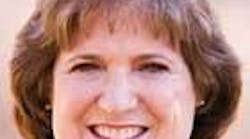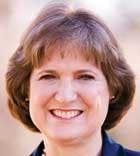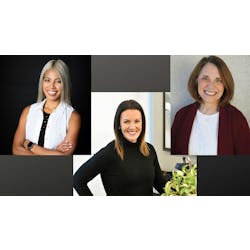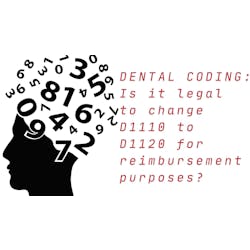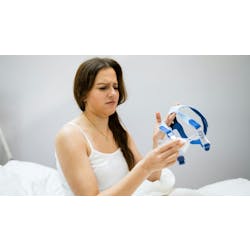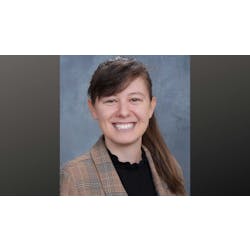by Chrtistine Nathe, RDH, MS
Diann Bomkamp, RDH, BSDH, is the new American Dental Hygienists' Association president. She is a wonderful inspiration for those dental hygienists working in private practice who really treasure their practices and patients, yet who are interested in promoting oral health in the public health arena. Diann has been a leader in her local and state associations, as well as serving multiple roles in the ADHA. And when I say multiple roles, it is truly astounding. She has served ADHA in so many capacities!
She is a member of Sigma Phi Alpha, the national dental hygiene honor society, and she has received numerous awards from her state association and prestigious ADHA awards, including the Warner-Lambert Excellence in Dental Hygiene Award, the Alfred C. Fones Award, and the Distinguished Alumni Award. By the way, Diann is a CDHC, which stands for Community Dental Health Certificate, a designation she received from the Wisconsin Northeast Technical College. I asked Diann some questions about her interesting career in dental hygiene. Here are her answers ...
Why did you decide to go into dental hygiene?
My uncle Jack, a general dentist, asked me to work for him as a dental assistant when I was 16 years old. I had thought about becoming a nurse, but I loved dentistry right from the beginning. My uncle was a wonderful mentor to me. He would perform procedures and continually explain what he was doing and why. His enthusiasm was contagious. Back then, he also employed one of the few dental hygienists in St. Louis, who also influenced me to go into dental hygiene. When I first graduated with a diploma in dental hygiene from Marquette University, I worked for my uncle, then continued my education by earning a BSDH. Even after having practiced as a clinical dental hygienist for 39 years, I still have a passion for dental hygiene.
How did you get into dental public health? Did you need additional education?
I became interested in dental public health through my many activities with ADHA and the Missouri Dental Hygienists' Association. The access to care agenda has been on the radar screen for many years, and I wanted to play a more active role in helping consumers who did not have easy access to oral health care. So, I enhanced some of my public health skills by obtaining a community dental health certificate from Northeast Wisconsin Technical College. As the Missouri Department of Health and Senior Services (DHSS) Oral Health Program was restructuring to utilize dental hygienists as oral health consultants, I applied for one of the positions and was hired part time. Although additional education was not required for my current position, I think it was extremely helpful for me. There is a different mindset in looking at the community as the patient, rather than the individual in private practice. I would recommend more public health education for anyone working in a public health venue. I cannot pretend to be an expert in all aspects of public health; this would likely require an MPH degree or more. But I can say that I have enjoyed working where dental hygiene began — in the community.
What are your current positions?
I also work as a clinical RDH in a periodontal office. I will go on a leave of absence from my clinical job and have to resign my public health position due to my position as current ADHA president!
However, let me explain my public health position. Our Missouri DHSS oral health team consists of five dental hygienists, including a dentist, Dr. Bonnie Branson, who is our oral health project manager. In addition, there is an MPH dentist consultant from UMKC School of Dentistry, our wonderful staff support, our Chief of the Office of Primary Care and Rural Health, and a Dental Advisory Board. As one of five oral health consultants, I mostly work with our DHSS Oral Health Preventive Services Program (PSP). This program is in place to improve the oral health status of Missouri's children. It is our perspective that oral health will improve best when the community takes an active role in improving it, so we try to recruit lots of community help. PSP has four parts: surveillance by a licensed dentist or dental hygienist to determine the current oral health status, oral health education, prevention and intervention utilizing two fluoride varnish applications per year for any child in Missouri, and referral to a dentist. Go to www.mohealthysmiles.com and see our Web site. The consultants have also worked hard to develop a K through 12 oral health educational curriculum. You can see it at http://www.dhss.mo.gov/oralhealth/OralHealthEducation.html.
Can you discuss any particularly interesting experiences you have had in your dental public health positions?
I have enjoyed working with the school nurses tremendously. They are the ones who see the effects of poor oral health every day. I love helping them see that we can turn some of this dental disease around with better prevention and routine care. I try to refer them to cost-effective sources of care, and when we find it, I believe that I have made a difference, even if it is in a small way. I feel good by educating them about oral health and enhancing their roles in improving total health. I think they are learning more about dental hygienists and the contributions we make.
Another highlight has been working at a recent workshop with Dr. Francisco Ramos-Gomez, who presented information on infant oral health with DHSS to dental professionals and Head Start staff. We were able to visit a Head Start Center and apply what he taught us by assessing caries risks and setting practical goals for parents at the Center. Stressing the value of early oral health prevention with the community was invaluable.
What type of advice would you give to a practicing hygienist who is thinking of doing something different?
See what is available in the public health arena in your state or community. Call your state or local dental health program and find out if there are opportunities in public health. In addition, check out the ADHA's public health section of their Web site to learn about continuing-education options in this area by going to http://www.adha.org/publichealth/index.html and the ADHA CareerCenter at http://careers.adha.org to see if there are any public health positions available.
Next month, recent ADHA projects will be discussed.
About the Author
Christine Nathe, RDH, MS, is a professor and graduate program director at the University of New Mexico, Division of Dental Hygiene, in Albuquerque, N.M. She is also the author of "Dental Public Health" (www.prenhall.com/nathe), which is in its second edition with Prentice Hall. She can be reached at [email protected] or (505) 272-8147.
